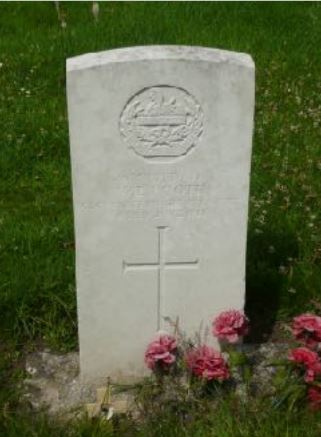7th Battalion, Gloucestershire Regiment

Walter Eli Booth was born at Daglingworth, just north of Cirencester in early 1886. He was baptised there on 26 April of that year. His parents were Albert George Henry Booth (1857-1913) and Matilda (née Curtis; 1859-1936). Albert’s profession was a butcher. The couple had seven children, of whom six were living by the time of the 1911 Census.
The family lived at Duntisbourne Rouse at the time of the 1891 Census but had moved to 152 Gloucester Street, Cirencester when a census was held ten years later. Walter was by then an under gardener on a farm. Moving forward another ten years, to 1911, the family had moved to 7 Barton Lane, Cirencester and Walter, now 24, was a farm labourer.
Both an Army Service and Pension Record have survived for Walter, so we know that he volunteered for military service on 26 April 1915, undertaking to serve for the duration of the war. The address given was 7 Barton Lane, Cirencester and his age was given correctly as 28. His father had died in 1913, so his mother was noted as next of kin. He elected to join the Gloucestershire Regiment and was initially posted to the 3rd (Reserve) Battalion for training.
His next posting was to the 7th Battalion, who were part of 39 Brigade, 13 Division. The battalion had been fighting in Gallipoli since 11 July 1915 and had sustained severe casualties in the Battle of Sari Bair (and in particular the assault on Chunuk Bair) in August. By the 1 September only eight Officers and 263 Other Ranks remained. The losses were replenished by men sent out from England and no doubt Private Walter Booth was included in one of the several re-enforcement drafts which arrived towards the end of September and during October. His Medal Index Card indicates that he was first posted abroad, to the Balkans, on 23 September 1915 but this may have been the date he left England, rather than arriving on the Gallipoli Peninsular.
He was to serve abroad until 30 December 1915, after which he was located at home. In his service record there is a hand written letter written from 147 Gloucester Street, Cirencester, after his discharge from the Army, in which he puts in a claim for a Silver War Badge, to signify his discharge from military service. The writing and syntax reflect a poorly educated man but it does give an insight into his movements when abroad, which is not apparent
from his service record. He states that he had served with 7th Glosters at the Dardanelles (an alternative name for the Gallipoli Peninsular) and was invalided from Suvla Bay to Malta, where he spent a month in St Paul’s Hospital with rheumatic fever. From Malta he was sent back to the UK, to a hospital at Stratford-upon-Avon, where he was a patient for six months.
Walter’s Pension Record shows that he arrived back in the UK on 31 December 1915. He must have, therefore, left the Gallipoli Peninsular in late November. He was placed on the strength of the Glosters’ Depot and was declared ‘no longer physically fit for war service’ and discharged from the Army on 2 June 1916. In all, his military career had lasted one year and 39 days. Evidently, he had shown ‘good character’ during this time. The record also details the medical condition which led to the discharge. In November 1915, whilst in Gallipoli, Walter experienced dilatation of the heart with breathlessness: due to the condition the heart does not pump efficiently. There was a history of acute rheumatism and prior to admission (to hospital) Walter could only walk very short distances. The medical board concluded that the condition was down to exposure on active service. A part incapacity allowance was granted, reviewed periodically and at the final review, in October 1917, Walter was deemed to have 70% incapacity. He was granted a Silver War Badge.
In the absence of sight of a death certificate it cannot be said with certainty that Walter’s cardiac condition was responsible for his death on 26 June 1918, aged 31 but it seems highly likely. Whether or not his resumed employment after his discharge in June 1916 is not known.
Private Walter Eli Booth was buried in Cirencester (Chesterton) Cemetery on 27 June 1918 and a standard CWGC headstone marks his grave. He is commemorated on the Cirencester War Memorial.
His younger brother, Frank, a former stable hand, served as a Corporal (17249) in the 8th Glosters and was killed in action on 18 November 1916, during the final days of the Somme Offensive: he is buried in Grandcourt Road Cemetery, in the former Somme sector and is also remembered on the Cirencester War Memorial.
Researched by Graham Adams 19 April 2021
